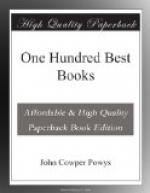PREFACE
This selection of “One hundred best books” is made after a different method and with a different purpose from the selections already in existence. Those apparently are designed to stuff the minds of young persons with an accumulation of “standard learning” calculated to alarm and discourage the boldest. The following list is frankly subjective in its choice; being indeed the selection of one individual, wandering at large and in freedom through these “realms of gold.”
The compiler holds the view that in expressing his own predilection, he is also supplying the need of kindred minds; minds that read purely for the pleasure of reading, and have no sinister wish to transform themselves by that process into what are called “cultivated persons.” The compiler feels that any one who succeeds in reading, with reasonable receptivity, the books in this list, must become, at the end, a person with whom it would be a delight to share that most classic of all pleasurable arts—the art of intelligent conversation.
BOOKS AND READING
There is scarcely any question, the sudden explosion of which out of a clear sky, excites more charming perturbation in the mind of a man—professionally, as they say, “of letters”—than the question, so often tossed disdainfully off from young and ardent lips, as to “what one should read,” if one has—quite strangely and accidentally—read hitherto absolutely nothing at all.
To secure the privilege of being the purveyor of spiritual germination to such provocatively virgin soil, is for the moment so entirely exciting that all the great stiff images from the dusty museum of “standard authors,” seem to swim in a sort of blurred mist before our eyes, and even, some of them at least, to nod and beckon and put out their tongues. After a while, however, the shock of first excitement diminishing, that solemn goblin Responsibility lifts up its head, and though we bang at it and shoo it away, and perhaps lock it up, the pure sweet pleasure of our seductive enterprise, the “native hue,” as the poet says, of our “resolution” is henceforth “sicklied o’er with the pale cast of thought,” and the fine design robbed of its freshest dew.
As a matter of fact, much deeper contemplations and maturer ponderings, only tend, in the long run, to bring us back to our original starting-point. It is just this very bugbear of Responsibility which in the consciences and mouths of grown-up persons sends the bravest of our youth post-haste to confusion—so impinging and inexorable are the thing’s portentous horns. It is indeed after these maturer considerations that we manage to hit upon the right key really capable of impounding the obtrusive animal; the idea, namely, of indicating to our youthful questioner the importance of aesthetic austerity in these regions—an austerity not only no less exclusive, but far more exclusive than any mandate drawn from the Decalogue.




